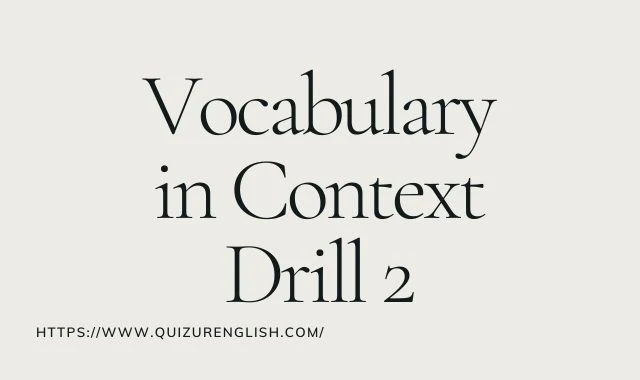Vocabulary in Context Drill 2
In the high-stakes world of standardized testing, a robust vocabulary is undeniably an asset. However, the SAT, ACT, and EST tests don't merely assess a student's ability to regurgitate word definitions. Instead, they emphasize "vocabulary in context," a skill that's both crucial for test success and a reflection of real-world language use. This article delves into the importance of understanding vocabulary in context and offers strategies to excel in this area on standardized tests.
What is "Vocabulary in Context"?
Simply put, "vocabulary in context" refers to the ability to infer the meaning of a word or phrase based on the surrounding text. Instead of relying solely on memorized definitions, students must use contextual clues to discern how a word functions in a particular sentence or passage.
Why is it Emphasized on the SAT, ACT, and EST?
- Real-World Application: In daily life, we often encounter unfamiliar words. The ability to deduce meanings from context is a vital reading skill, reflecting genuine comprehension rather than rote memorization.
- Depth of Understanding: Recognizing a word in isolation is different from understanding its nuances in varied contexts. Standardized tests aim to gauge a student's depth of vocabulary knowledge and adaptability.
- Diverse Passages: These tests feature reading passages from various genres, time periods, and disciplines. A word might not always carry its most common meaning, making contextual understanding essential.
<->
Strategies to Master Vocabulary in Context:
- Practice Active Reading: As you read, underline or note unfamiliar words. Before reaching for a dictionary, try to infer their meanings based on surrounding sentences. Then, validate your inference with a dictionary.
- Expand Your Reading Horizons: Diversify your reading materials. Tackle texts from different genres, cultures, and time periods. The more varied your exposure, the better equipped you'll be to handle diverse passages on the test.
- Look for Contextual Clues: Words or phrases nearby can hint at a word's meaning. Synonyms, antonyms, examples, or cause-and-effect structures in the sentence can provide valuable clues.
- Practice with Real Test Materials: Familiarize yourself with the format and types of questions on the SAT, ACT, and EST. Official practice tests can give you a feel for how vocabulary in context questions are framed.
- Stay Calm and Think Logically: If faced with a challenging word on test day, don't panic. Eliminate answer choices that don't fit the passage's tone or theme, and trust your instincts.
In conclusion, while a vast vocabulary is beneficial, the SAT, ACT, and EST tests require a deeper level of word understanding. By focusing on vocabulary in context, students can not only enhance their test performance but also cultivate a valuable life skill.

